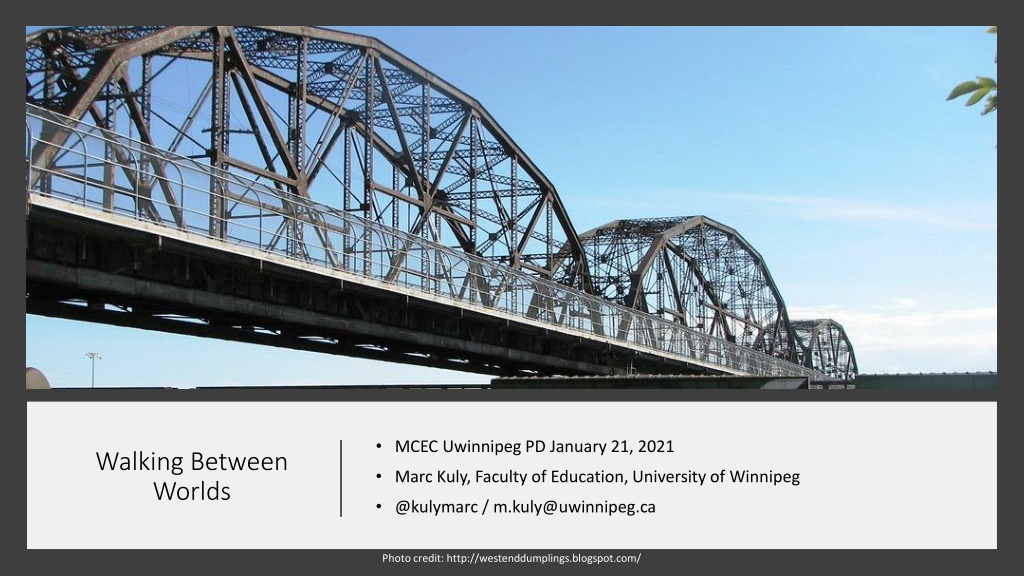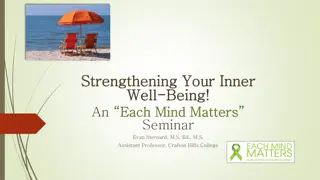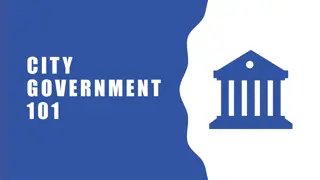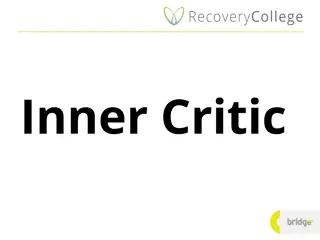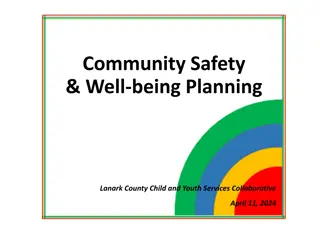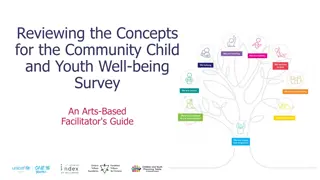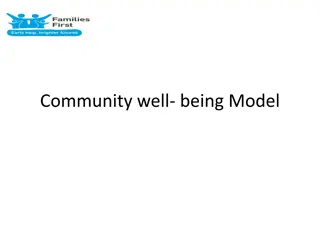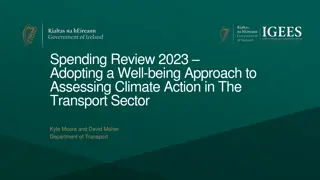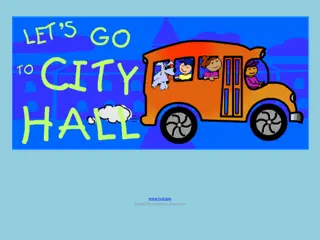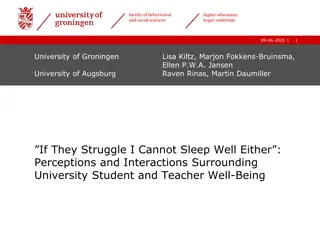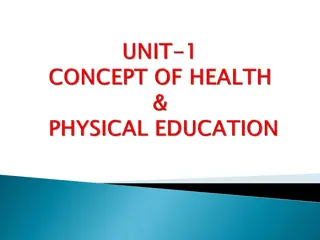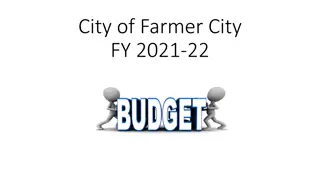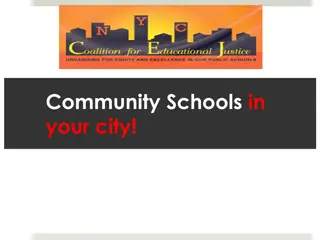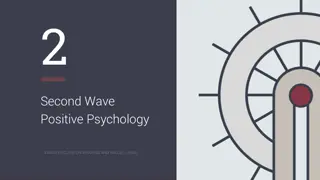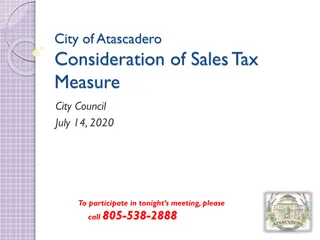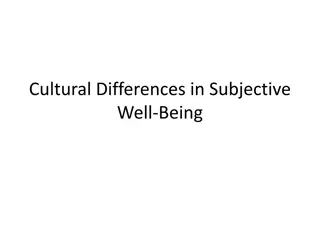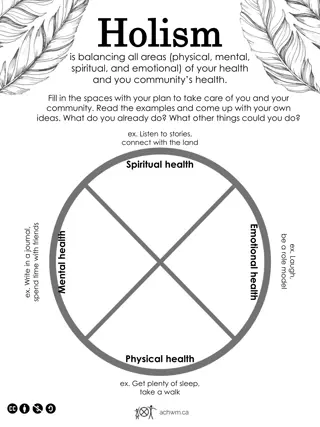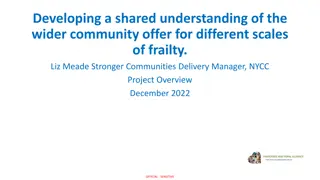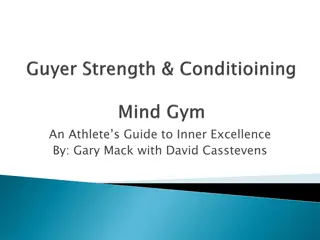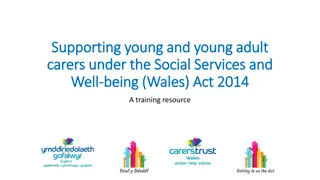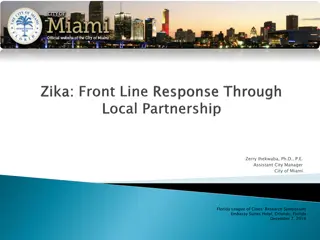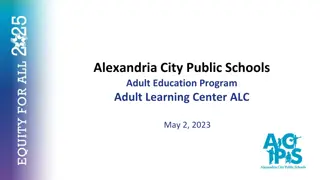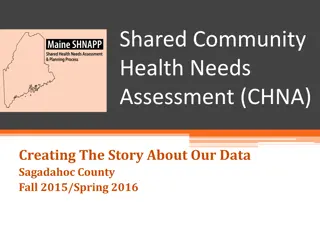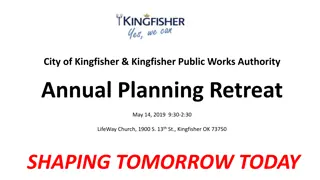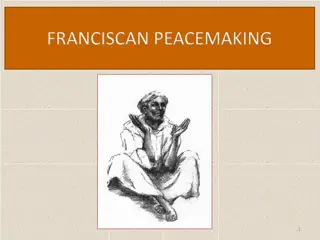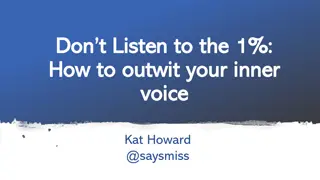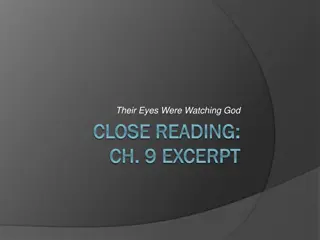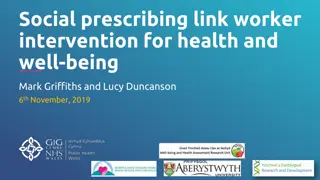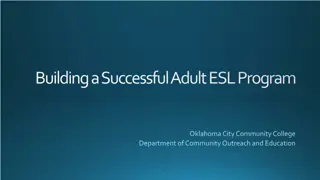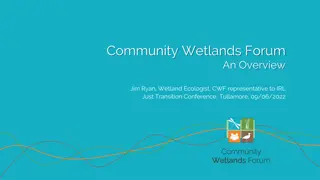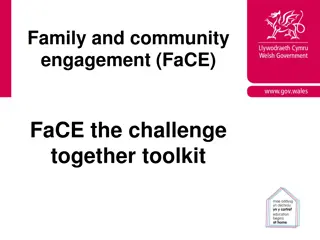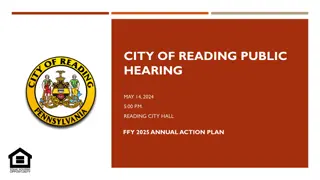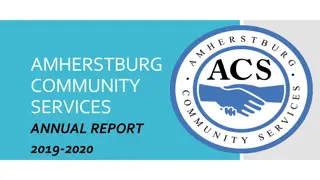Challenges in Inner-City Education and Community Well-being
In the inner-city community, disparities in education, health, poverty, and employment are stark. Indigenous residents face lower graduation rates and life expectancy, while surveillance and racialized harassment perpetuate systemic injustices. Understanding these issues is crucial for creating positive change and supporting marginalized populations.
Uploaded on Sep 19, 2024 | 0 Views
Download Presentation

Please find below an Image/Link to download the presentation.
The content on the website is provided AS IS for your information and personal use only. It may not be sold, licensed, or shared on other websites without obtaining consent from the author. Download presentation by click this link. If you encounter any issues during the download, it is possible that the publisher has removed the file from their server.
E N D
Presentation Transcript
MCEC Uwinnipeg PD January 21, 2021 Walking Between Worlds Marc Kuly, Faculty of Education, University of Winnipeg @kulymarc / m.kuly@uwinnipeg.ca Photo credit: http://westenddumplings.blogspot.com/
Education: 40% of inner-city residents have no high school diploma Indigenous residents of Manitoba are graduated by Manitoba schools at roughly half the rate as non-Indigenous residents Health: 10-year difference in life expectancy between Point Douglas and Fort Garry Poverty Rate: 33% in the inner-city compared to 11% in the rest of Winnipeg 49% amongst Indigenous inner-city residents Age: median age is 13 years younger than the rest of Winnipeg Employment: 92% employment rate in the inner-city compared to 94.5% in the rest of Winnipeg Indigenous population: 20% in the inner-city compared to 8% in the rest of Winnipeg
Key Findings Two Worlds: The System and Home The System: Inescapable Surveillance, Incoherence & Violence Home: Love is love School: A space between worlds
The System: Surveillance & Violence When I was growing up the CFS watching our house and us growing up right? Lots of kids like us. So, they knew there was partying in the house, they knew there was kids in the house, this stuff, but no one ever came. But then yeah, so even the police knew the house, right? Because they would always be calling for disturbances, whatever. So, CFS and police definitely knew our house. And then, yeah, just even the cops too. There was a few times where my brother, he knew his rights. He said, "You can't come into my house without a warrant." And then [the cop] just put on some black gloves and just choked the shit out of my brother and grabbed him by the neck and threw him on the couch and just choked him.
The System: Racialized Harassment Inner city, yep. My brother got ticketed. My brother s like, "What about those guys, the white kids riding on the bike, with double disc brakes, jumping all over in and out of traffic on the sidewalk?" And they're like, "Nope, nope, nope." And then they gave him a $150 ticket. My brother doesn't work, doesn't have an education. He's like, "How can I pay for this ticket?"
The System: A constant threat Regardless of the situation at home, students do not want to be in CFS. They know that the situation is unsafe, and CFS doesn't seem like the better option ever. Just simply because you are then away from family, away from friends, and ripped from everything that you do know and that you do have a little bit of control over.
It was quite a while ago. I think it was before we ended up down towards this side of the North End. I guess the school had gotten a phone call about fighting in the home and so we were apprehended at the school in the middle of the day. My parents had no idea what was going on until we were already gone. All I remember was being at a strange person s house for over a month with like eight other kids and the food being so bland and gross that it was just that was my entire life for the entre month, just bland, grey. That s all I remember it being. My parents did what they had to do and they hid what they needed to hide in order to get me and my brother back and then they went back to what they had always been just in a more secretive manner.
But from that experience I knew Im going to choose to couch surf and do whatever I need to do in order to be where I want to be rather than be somewhere where someone says I have to be because they say it s better for me. So yeah, I chose not to tell the school anything and I just figured it out on my own. Do I wish it would have been more accessible for me to be, Hey it s not safe for me at home, I m under 18, I would like to be somewhere else ? Absolutely, but that is not an option. You have to be 18 or you have to be in the CFS system. There is no other alternative. Pick your poison.
The System: Necessary but Incoherent Support Marc: Right. Well, speak your truth when you go to that intake meeting. Jordin: I can't. Marc: You can't? Jordin: No. Marc: What happens? Jordin: Because I applied for single parent. Marc: Oh, but you are. It's just that he's- Jordin: If they know that he's living here while I'm applying, Plus I have to say... because they'll want to get me to get child support. But I'll be like, well he s homeless and he has no paying job or anything. Marc: Right. And then... oh my God. Jordin: Yeah.
Home Inter-generational legacies (Addiction, Crime, Incarceration) It takes all day to be poor Poverty does not equal lack of love Sophisticated attachments Cultural vitality Community Organizations and Mobilization Peer networks
When you come back to school in September and after the breaks those are the hardest times. The beginning of the year is exciting for most students because you get to go back and see your friends and you had a great summer of like, doing whatever you did with your family, camping, all those fun things, you have all your new school supplies for the year you remember that good feeling of having that good stuff? You don t get that when you have the family that I did. So, you are going into school wearing the same stuff you did last year. Or like, with a few mismatched things or in things that you threw in the closet and it looks new but it s not new. And you don t have school supplies. So, all of your friends are showing off all of the cool stuff like, we went on vacation, or we spent the whole month at the cabin and like, uh, I biked to Kildonan Park and scrounged up enough change to go swimming. My summers were never that special and then especially Christmas, going after Christmas, there was no Christmas. Well, there was a Christmas dinner, absolutely. My Family, after they stopped trying to do presents and birthdays, they stuck with doing dinner. So, it s like you don t have anything to talk about so you either make things up or you just don t talk to anybody. And I did both.
Unrecognized Vitality I think they say, our DNA has like - oh this is going to sound so dumb, but, our DNA has a memory and when I hear my grandparents talk or my great grandparents they always say that they had a village I feel like we always need a village and I feel like that s how we operate in the best way that we can because we have people, supports from all ends, families, cousins I guess, who help. We have our own circles.
Similarities: The School System & The System Surveillance: Watched but not seen Consequential power Policy based approach Systemic & Individual Racism Success in spite: Resistance & Creativity required Pockets of safety and support Rare but essential caring individuals
School as a Game I started hiding with my friends hiding in the school. We would always just go into the bathroom and hide there until class was over, lunch time, or we would like leave class just to go hide somewhere. We just sat there and hanged out there and talked and sometimes it got really dark and I don t feel like talking about that because we were in grade eight and my friends, they were really toxic with each other. I felt like I didn t fit in at school, or even at home and how bad my mental health was, that was the worst part of my life, so far. Sometimes they would call my Papa and sometimes we would have meetings and talk about it and I would like pretend that I m gonna not do something again and then when they leave, I start doing it again.
Jordin: This one harsh teacher she got mad at me and I just got up and started calling her names in class [Jordin smiles and hesitates] Marc: You can say the word Jordin: I called her a bitch and then, she stopped talking, and just sat down. I was scared because if it was anyone else it would have been the office right away but [pause] I feel like she did know that I was struggling a lot. She just stopped talking and just sat down she s a really harsh teacher too so, I m still scared [laughing]! Marc: So she just sat down that s it? What did you do? Jordin: That was it I apologized to her eventually like three years later she was really happy to see me! Marc: What does that tell you? Jordin: I think that if you know them at their worst it is easier to talk to them.
Policy before People I knew I was put in like, a lower class. We were all in the same class and I m like. Mmm okay, I know what class I m in. Because, I dunno just like the teachers and that. Well, in the morning we would be in our English class, like we would move from class to class like normal, but we were all together. That s how I started to get the feeling that like, this isn t a normal class. Honestly, I thought she was just there getting her paycheck. Like she was just there to teach. After the lesson she d just go back and sit on her desk. She d just assign normal English, reading studies and that, I forget the book. She was just, so much attitude came from her. I remember one time I started dozing off in class and she was like, if you don t want to come here and learn why don t you just go get a job I m like, get out of here!
Systemic & Individual Racism I feel like they thought, um, that I had somehow gotten into the school or these classes - even though I did really well in grade nine because you had to be accepted. I think they thought there was some sort of number that they had to reach I guess for Indigenous students in those classes and that I didn t necessarily know what was going on I suppose. I did really try. I did get a good mark at the end of the year, but I didn t stay.
Sage: theres not a lot of Indigenous students in that school, I would say, like if you walk the hallways you dont see a lot of familiar faces. But I remember there was this one day I was in French and I guess apparently one student got into a fight earlier in the day and my French teacher pulled me out and said, I thought you got into a fight this morning and you were sent home. And I said, that wasn t me! Me: Who was in the fight? Sage: Another Indigenous student with somebody walking by. Me: So, did that Indigenous student look like you? Was she in the same grade? Sage: Not really, no. I think she was in grade 11 and I was in grade 10. We both kind of had long black hair, both a little bit tan.
The Cost of Success We have to give up a little bit of our ego, our self-esteem because in school when they do talk about Native studies or Indigenous studies and they bring it up in history or other classes a lot of the time its mostly negative feedback from other students. Then the teacher will say, oh, it s okay, it s just a short chapter we ll get through it. And it just kind of buries it down deep where we are very we struggle with who we are even more and get ashamed of who we are because nobody cares and add to that the racial profiling and being embarrassed or pointed out more.
Yeah there was like no representation of me, my culture, nothing, and it was like I wasn t comfortable there you know. I djust pretend to just put on my white skin and be like let s go and get this done, right? But that s how it was you know, I couldn t feel like I could take pride in who I was and I just had to be another number and just get it done. Yeah.
What differentiates schools from the system? Size matters Representation matters Cultural connections Community connections Teachers who make a difference
Characteristics of teachers who made a difference Being Known Earned Trust Through Action Resonant & Enduring Relationship Builders Oriented to Allegiance
Being Known He took an interest in me but in a way that seemed just like, Hey, are you okay? You re always quiet, you sit in the back, you don t talk or answer questions. And I said, yeah, you know, when I feel like I can answer a question I will. He was like, Okay, take your time. And, like in that year it was sort of hard for me but I was going everyday and he noticed that. Like, I love movies and he loves movies and we d talk about movies and he s like, would you want to write a movie assignment or would you want to write an assignment about your favourite movies, your favourite directors, actors? Or write a screenplay? You know, show me what you are interested in. And I was like, Yeah! Awesome. And that year I got my first 100% in school, like in high school. Because like, he was so invested into who I was and my background and what I was interested in that it made it so much more enjoyable.
Earning Trust Jon: And with my basketball coach, I thought I could trust him and I remember one time he picked me up at my mom s place just down the street where I lived on Main there and it was just like, a really sketchy place. And it was so funny seeing like, he s not from around the North End right! Marc: Yeah, he s a big tall white guy! Jon: (Laughing) Yeah, huge! Totally suburban! He picked me up for basketball practice, came to my house, knocked on my door was just the most funniest thing ever. He looked terrified! He was like, is this where you live? Like crazy! Marc: How did you feel, judged? Jon: Nah, he was kind of, I felt like he knew all that - but to see what I was in - like, damn! But, yeah, it was tough but you know he was there for me - so it was good.
Oriented to Allegiance Kaitlyn was not having it. She pointed out that we are not children, we know what is going on, we understand, and you don t have to talk to us like we are babies. In school we were expected to friggin shine but when we went to this new placement where they didn t know that we were doing all the other things that the smarter kids would be doing in other schools they would look at us like we didn t know anything.
Recommendations for teachers Purposefully plan for purposeless conversations See the structure Stand up and with and for students Find allies Reflect on your own construction
Wisdom of Experience Jon: They have their heads up their butts! But you know, I get it right? You know, you earn a certain amount and you want to live a certain way, but it doesn t mean you have to be a jerk because you make a certain amount. You know, one bad thing and you are at the bottom, you know? You just, you gotta try to be humble. Sage: That s what they forget - one bad thing could change it all. Misty: Unless one bad thing has happened to them - that one bad thing that happened to my parents completely changed the course of their life and mine absolutely! I think my life would have turned out differently if my Dad hadn t almost passed away and had to stop working but you don t stop. You figure something else out. That is one thing that people who grow up in the inner city have - ridiculous problem-solving skills and they will pretty much be able to survive anything because of the hardships that come out of it.
A sense of purpose Summer: Um, well for me, like, when I like, want to excel in something like academically or occupation wise I m like, for me its more like, like I want to beat you at your own system kind of thing. Meghin: Pure sass! Marc: When have you felt that way? Summer: I feel like since I have graduated high school that s kind of how I ve felt. Cuz after high school I was like, I didn t want to go back to school at all I was like I am done with this for the rest of my life I m going to go live in the bush. Now I m like, if I m not part of the solution then I m part of the problem kind of thing. So, I m like, my mindset is like, well now I m going to go through your system and I m going to beat you in your own system.
Sources of Statistics Government of Manitoba. (n.d.-b). Successful grade nine attainment. Retrieved November 8, 2018, from https://www.edu.gov.mb.ca/k12/grad_rates/grade9.html Government of Manitoba. (2018a). Assessment and evaluation. Retrieved from https://www.edu.gov.mb.ca/k12/assess/tests/index.html Government of Manitoba. (2018b). High school graduation rates and student achievement statistics. Retrieved November 8, 2018, from https://www.edu.gov.mb.ca/k12/grad_rates/sd/ McCracken, Molly & Smirl, Ellen. (2017). Winnipeg s Inner City. Canadian Centre for Policy Alternatives. Retrieved from https://www.policyalternatives.ca/publications/facts-infographics/winnipegs-inner-city Monkman, L. (2018). Indigenous incarceration rates: Why are Canada s numbers so high and what can be done about it? Retrieved from https://www.cbc.ca/news/indigenous/indigenous-incarceration-justice-system-panel-1.4729192
